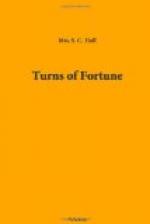Though Sarah Bond had used every means within her power to conceal her place of retreat, yet she often felt bitterly pained that no one had sought her out. She said she wished to be forgotten, unless she had the power to clear away the imputation on her father’s name. And yet, unknown to herself, she cherished the hope, that some one would have traced them, though only to say one cheering word of approbation regarding their attempt at self-dependence. Sarah thanked the Almighty greatly for one thing, that Mabel’s cheerfulness was continued and unfluctuating, and that her mind seemed to have gathered strength by wholesome exercise. She believed her affections, if not free, were not entangled, and that her pride had risen against her imagination; and it was beautiful to see how, watching to avoid giving each other pain, striving continually to show the bright side of every question, the one to the other, and extract sweets instead of bitters from every little incident, led to their actually enjoying even the privations which exercised their tenderness towards each other.
Time wore away many of their sorrows, which old father Time always does; a kindness we forget to acknowledge, though we often arraign him for spoiling our pleasures. Sarah and Mabel had been taking an evening walk, wondering how little they existed upon, and feeling that it was a wide step towards independence to have few wants.
“I can see good working in all things,” said Mabel; “for if I had obtained the companionship of books, which I so eagerly desired at first, I should not have had the same inducement to pursue my active duties, to read my own heart, and the great book of nature, which is opened alike to peer and peasant; I have found so much to learn, so much to think of by studying objects and persons—reading persons instead of books.”
“Yes,” added Sarah Bond; “and seeing how much there is to admire in every development of nature, and how much of God there is in every human being.”
As they passed along the village street, Mabel observed that the cottagers looked after them, and several of her little pupils darted their heads in and out of their homes, and laughed; she thought that some village fun was afloat, that some rural present of flowers, or butter, or eggs, had been sent—a little mysterious offering for her to guess at; and when she turned to fasten the wicket gate, there were several of the peasants knotted together talking. A sudden exclamation from her aunt, who had entered the cottage, confirmed her suspicion; but it was soon dissipated. In their absence, their old friends Mr. Goulding and the curate had arrived by the coach, and entered their humble dwelling. From a wagon at the same time were lifted several articles of old furniture, which were taken into the cottage, and properly arranged. There were two old chairs, an embroidered stool, a china vase, a cabinet, a table, and the spinnet. Strangely the furniture looked




